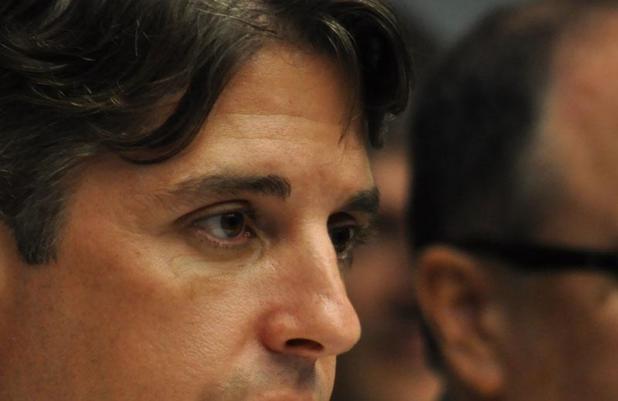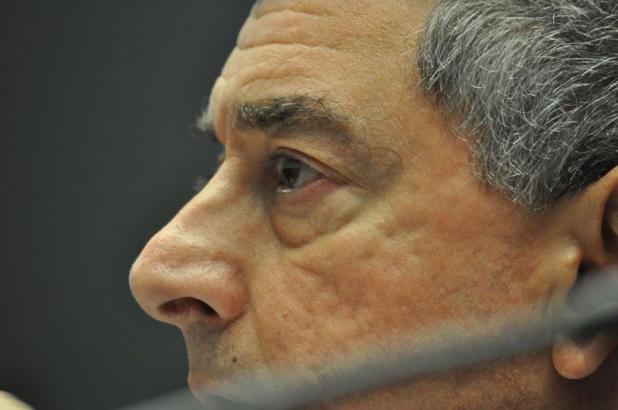
Manship School News Service/Sarah Gamard
Appropriations Chairman Cameron Henry

Manship School News Service/Sarah Gamard
Commissioner of Administration Jay Dardenne
Analysis: The cost of NOT doing business
BATON ROUGE – The second extraordinary session of 2017 already seems ordinary.
The House took a three-day weekend to cool down following its nasty regular session close Thursday, but still convened in normal fashion Monday, 90 minutes tardy. Members continued to playfully fling rubber bands and foam balls at each other, topping off that with a musical birthday tribute to a colleague when the session convened.
Some lawmakers have expressed concern that the next seven days of the extraordinary session will be no different from the previous 60, even though the process by which the Legislature approves the state operating budget must begin anew.
And it must be done quickly. The deadline for the close of this special session is Monday, and the state agencies have no authorization to spend when the new fiscal year begins on July 1. The House Appropriations Committee heard testimony on essentially the same version of House Bill 1 which left that chamber two weeks ago. The measure, carrying the sponsorship of Appropriations Chairman Cameron Henry, R-Metairie, currently would withhold $206 million from state agencies as a precaution against an unexpected midyear revenue shortfall.
Negotiators from the House had agreed to lower the holdback to $100 million by the end of the regular session. The senators wanted to distribute the entire amount of forecast revenue but instruct state agencies to spend prudently – just in case.
That’s where negotiations over 2/10ths of a percent of Louisiana’s $29 billion budget ended at last Thursday. When the 6 p.m. deadline arrived, the bill, along with their companion bills House Bills 2 and 3, which prioritized and funded state and local construction projects, died on the legislative vine.
“The budgets have a better chance of passing this time around because they are the entire focus,” said Commissioner of Administration Jay Dardenne, the governor’s chief financial officer.
“There are no other bills to hear. Legislators are having to face the possibility of telling the public, ‘I can’t do the job you’ve elected me to do’ for another week.”
Gov. John Bel Edwards has called four special sessions since his inauguration in 2016. They cost taxpayers $60,000 per day to run, even when they take off some of the days.
Effects of budget instability go beyond the potential cost of further negotiation.
“Bonds and loans are harder or more expensive to secure because we refuse to live within our means,” Henry said. “We have certain projects we cannot accomplish because banks recognize budget gimmicks and see midyear cuts.”
The current budget also delays payments on $28 million in legal settlements the state has incurred through judgments rendered, $10 million of which accrue interest over time. Henry said there’s not enough money to pay them.
That interest will likely build up until the Legislature finds new forms of revenue, which it failed to do this year, or unless it further cuts razor-thin operating margins for state agencies. It won’t be able to try again in regular session until 2019 because the Legislature constitutionally is forbidden to take up revenue raising measures in even-numbered years.
“It’s my understanding that the governor will call us back into another special session if we don’t pass the budget he wants by June 19,” Henry said. “He’s setting a precedent for the next session that he’ll keep calling us into special session until he gets his way. That’s not how you run a democracy, that’s more like a dictatorship.”
If the Legislature can’t come to a compromise and pass a budget by the beginning of the new fiscal year on July 1, no one is sure what will happen.
“That’s something we’ve been talking about,” Dardenne said. “But I don’t know. There’s no statutory measure or precedent. We could try to do something on a month-to-month basis where the division of administration and the treasurer’s office fund agencies [proportionately]” with the revenue from taxes that will keep arriving with or without an authorizing document to spend it.
Funding agencies by their size or total operating budget does not allow lawmakers to prioritize based on need or value, which is essentially why the budgeting process exists.
“That’s just never happened before,” Henry said, acknowledging there’s still room for compromise. “We want to pass a responsible budget. We would have liked to do that last Thursday, and we’d like to do it now.”
The special session will be half expired Wednesday. HB 1 is expected to hit the House floor for discussion and passage on that day, then then head to the Senate for its take. By Friday, it could be ready for a committee of three representatives and three senators to come to a compromise over differences.
But the Legislature was in that exact spot a week ago and it ended up in a House meltdown.
To add to the dilemma, there’s a hurricane supposedly heading for the Gulf. That would make two storms facing Louisiana.
Matt Houston is a journalism major at the LSU Manship School of Mass Communication from Tyler, Texas.
